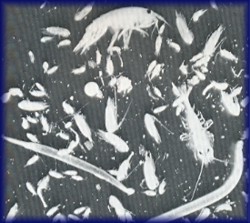|
Beware cherished explanations
Scientific explanations: they ain't necessarily so, you know. Scientists have long observed that sudden outbursts of diatom1 growth "occur every year within a few days of its average occurrence for that locality"2 in the world's oceans. For decades oceanographers have consistently taught that this sudden increase in phytoplankton1 density (pic top left) in surface waters is simple to explain:
The occurrence of this startling SDI (spring diatom increase) is not really difficult to understand. First, the light-energy required for photosynthesis is available only in the surface waters of the oceans. Secondly, when a body of water like an ocean. is heated by solar radiation by way of the surface, a temperature. stratification of the water results. 2
In short, phytoplankton numbers are very low during winter but explode in spring when light and temperature increase in surface water. But it just isn't so:
A new study concludes that an old, fundamental and widely accepted theory of how and why phytoplankton bloom in the oceans is incorrect. The new research concludes that [the] theory. offers an incomplete and inaccurate explanation for summer phytoplankton blooms that have been observed since the 1800s in the North Atlantic Ocean (Old Theory of Phytoplankton Growth Overturned).
As the article explains, the theory held up for so long because it ". made common sense and seemed to explain what people were seeing". But new data provided by satellite remote sensing technology show that phytoplankton is actually more abundant in colder winter water than previously thought. It's just not so obvious because it is much more diluted, spread out through a larger portion of the water column. Growth of plankton takes place in the surface waters during the winter, but winter storms and wind cause the surface waters to mix with deeper water, carrying much of the biomass with it. When balmier days of spring arrive, the mixing drops off and myriads of plankton rise to the surface. Yes, it does grow at a more rapid rate as spring strengthens, but "the physical mixing of water has as much or more to do with the success of the bloom as does the rate of phytoplankton photosynthesis".
Another factor in the annual cycle has come to light for the first time: zooplankton (pic above right). Zooplankton consist of tiny animals that eat the phytoplankton that do the work of creating food through photosynthesis. In winter, when the tiny plants are thinly spread out, the tiny animals can't find enough food, so they die and sink to the bottom, leaving the phytoplankton to increase without hindrance. As the phytoplankton begins to concentrate in the surface waters in spring, getting their daily bread becomes a lot easier for the zooplankton. Their numbers begin to increase
|
exponentially in lockstep with the phytoplankton; by mid-summer their numbers are so great that when the nutrients for photosynthesis become depleted, photosynthesis ceases, and the zooplankton gobble up the remaining phytoplankton so rapidly that the bloom vanishes seemingly overnight.
Many surprises await those who investigate the works of God. His genius knows no limits. Again and again scientists have been forced to change their view of nature's workings. Just when they think they have got something sorted out, new data forces a reappraisal.
The moral of the story: beware of cherished explanations, as they can be just plain wrong. This truism applies equally to explanations by Christian scholars and theologians of the meaning of God's Word and Will. The God who created the seas and everything in them is one and the same as He who called Abraham from Ur and Israel from Egypt and Christians from the world. Those who devote themselves to studying His works of grace can be just as wrong in their theories as scientists who study His Works of creation are in theirs. As a classical example, consider what Christian theologians, almost to a man, say about the "Jewish" temple. A study note in the Geneva Study Bible on Isaiah 38:22, where King Hezekiah speaks positively about going into the temple, remarks,
This was the place specially designed by God for worship from the time of Solomon until the time of the church.
The commenter clearly implies that the arrival of the church renders the temple obsolete in God's dealings with man. You couldn't get wronger if you tried. (Grammatical error intended.) Well, yes you could, actually. I read somewhere (but now can't find it) that the destruction of the temple by the Romans amounted to divine judgment against the temple for its uselessness. Now that's really the wrongest. The temple was destroyed because the people did not deserve access to this brilliant blessing any more (Matt. 23:31-38)! When the time is right, Jesus will reign from a newly-built temple in Jerusalem (Ezek. 43:7).
Truth is, scientists set a much better example of processing information than theologians do. When will Christian theologians stop letting their anti-Jewish preconceptions cloud their thinking and start taking all of the Bible, not just Paul (whom they massacre) and the gospels, as revealed truth? Seeking to understand the mind of God is a serious business, one which should be approached with fear and trembling. Superficial, pat answers to matters of grace, no matter how sacrosanct, should be rejected as vigorously as shallow scientific explanations of natural phenomena. Students of Scripture need to cast off the shackles of established dogma and read the Word of God afresh. Undoubtedly, many surprises await them.
|





